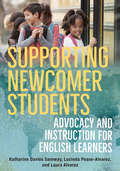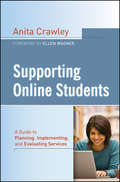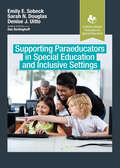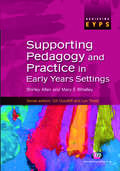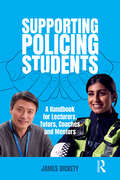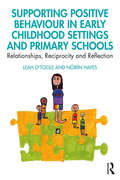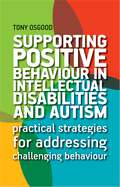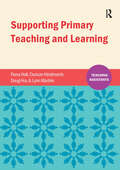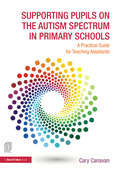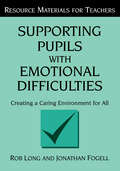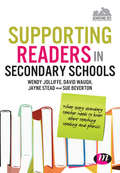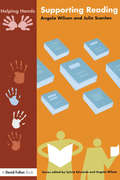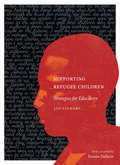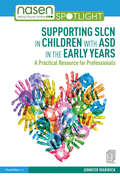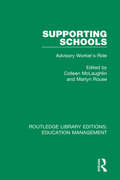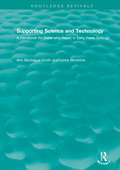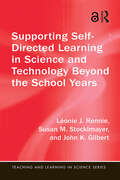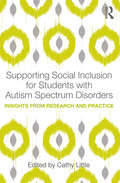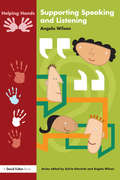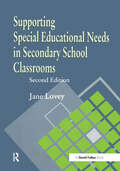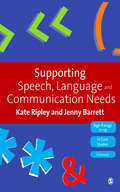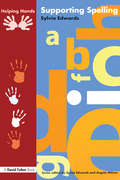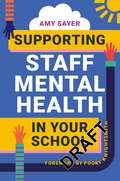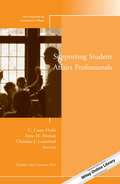- Table View
- List View
Supporting Newcomer Students: Advocacy And Instruction For English Learners
by Lucinda Pease-Alvarez Katharine Davies Samway Laura AlvarezCopublished with TESOL Press Newcomers need to draw on all their resources—intellectual, linguistic, cultural—as they make sense of new content and a new language. In this much-needed book, the authors marshal research and several decades of their own experience to provide instructional practices and activities that will help teachers develop newcomers as readers and writers of English and engage them in content learning across the curriculum. Equally important, they show how teachers can advocate for these vulnerable students, many of whom have experienced multiple challenges in their home countries or in the United States, including poverty, violence, and political persecution. With chapters on assessment and second-language acquisition as well as reading, writing, speaking, and content learning, their book is a timely and comprehensive guide for any K–8 educator whose classroom or school includes newcomer students.
Supporting Numeracy: A Handbook for those who Assist in Early Years Settings
by Rita HeadingtonFirst Published in 2001. Routledge is an imprint of Taylor & Francis, an informa company.
Supporting Online Students
by Anita CrawleySupporting Online Students shows how effective and efficiently delivered support services improve academic success and course retention for online learners. Drawing on a decade's worth of research, Crawley describes the scope of services that should be made available to online students, from admissions and registration to advising and student engagement. The book includes guidelines and standards for these services as outlined by half a dozen national professional organizations, as well as planning and implementation, innovative practices, and specialized services needed by particular online student groups.
Supporting Paraeducators in Special Education and Inclusive Settings (Evidence-Based Instruction in Special Education)
by Sarah Douglas Emily Sobeck Denise UittoSupporting Paraeducators in Special Education and Inclusive Settings provides an in-depth look at the role of pre- and in-service teachers as supervisors of paraeducators within special education and inclusive settings.The latest entry within the Evidence-Based Instruction in Special Education series, Supporting Paraeducators in Special Education and Inclusive Settings serves as an instructional tool for pre-service teachers and educators within higher education coursework, as well as a resource for in-service teachers. This text supports teachers in strengthening their knowledge and supervisory skills necessary to supervise and manage paraeducators in educational environments.Through objectives, scenarios, content, and chapter questions, Drs. Sobeck, Douglas, and Uitto provide a thorough and applicable overview of working with and supervising paraeducators. In this text the roles and responsibilities of paraeducators, teachers, and school administrators relative to paraeducator training and supervision will be detailed, as well as tips for collaboration.Included with the text are online supplemental materials for faculty use. School leaders and higher education faculty can use the online site for materials to support pre-service training within teacher preparation programs and professional development for in-service teachers.Supporting Paraeducators in Special Education and Inclusive Settings fills an important need in the field and is a vital resource for current and future teachers when working with paraeducators.
Supporting Pedagogy and Practice in Early Years Settings (Achieving EYPS Series)
by Mary E. Whalley Shirley F. AllenTo achieve EYPS, candidates must understand the Early Years Foundation stage (EYFS), and how to put it into practice. This text supports those on all EYPS pathways to extend their knowledge and understanding of effective pedagogy within the context of the EYFS. It begins by looking at effective practice in the EYFS and how research has informed recent initiatives. It goes on to cover children's learning and development, safe and stimulating environments and the role of the adult. The text considers how EYPs can support others in their practice to improve the delivery of learning throughout their setting.
Supporting Policing Students: A Handbook for Lecturers, Tutors, Coaches and Mentors
by James DicketyThis is an invaluable guide for those involved in supporting policing students, including lecturers, tutors, trainers, mentors and coaches. It integrates quality research and practice to help anyone in these roles provide optimal support and guidance to their policing students. Shaping the next generation of policing officers and staff comes with a unique set of challenges, so chapters cover a myriad of useful subjects related to coaching models and theories and how to apply these in a policing context. Additionally, you will find insightful teaching tips, including effective feedback strategies and guidance on addressing challenging topics like domestic abuse and courtroom appearances. Accessibly written, this book can be explored from start to finish or used as a reference guide, and includes reflective exercises and real-life policing examples to help you apply theory to practice, creating an enriching learning experience for both you and your students.
Supporting Positive Behaviour in Early Childhood Settings and Primary Schools: Relationships, Reciprocity and Reflection
by Nóirín Hayes Leah O'TooleSharing insights of various theoretical perspectives to help understand the complex root causes of children’s behaviour, Supporting Positive Behaviour in Early Childhood Settings and Primary Schools highlights key responses that can encourage positive mental health, resilience and behaviour. Drawing on a range of theoretical frameworks, this book: Translates theoretical insights into adaptable and practical responses Considers children's strengths and needs with regards to resilience and mental health Includes case studies, tasks and questions for reflection Identifies innovative practical strategies for supporting positive behaviour in educational settings Combining theoretical perspectives on supporting positive behaviour, Supporting Positive Behaviour in Early Childhood Settings and Primary Schools is user-friendly and conceptually unified. It gives early childhood and primary students and teachers a clear understanding of what to do to facilitate positive behaviour and why to do it, encouraging true professionalism in education, and ensuring children learn and develop to their highest potential.
Supporting Positive Behaviour in Intellectual Disabilities and Autism: Practical Strategies for Addressing Challenging Behaviour
by Tony OsgoodThis highly practical book is an accessible and grounded handbook for addressing challenging behaviour in children and adults with intellectual or developmental disabilities (IDD), including autism. It recognises that challenging behaviour does not appear out of nowhere and is meaningful for the person exhibiting it. Behaviour can be communicative and an important signifier of underlying sensory or environmental issues. Focusing on a person-centred approach throughout, the book has advice and strategies for working with the client's families, support staff and professionals. It also presents best practice for analysing and addressing challenging behaviour in various settings such as schools, hospitals and the home, all while stressing the need to keep the human story at the heart of any assessment and intervention. Each chapter features questions for discussion or reflection and exercises for the reader to complete. Informal, frank and free of jargon, this is indispensable for professionals, parents, and anyone working with people with intellectual disability or autism.
Supporting Primary Teaching and Learning (Teaching Assistants)
by Duncan Hindmarch Lynn Machin Fiona Hall Douglas HoyThe book is aimed at all those studying on Foundation Degrees in supporting primary and early years teaching and learning, and particularly those working at levels 4 and 5. It is written in an accessible style with a focus on work-based professional development and encourages critical reflection throughout. It starts with a discussion of reflective practice, and includes helpful guidance on developing effective study skills. Each chapter then focuses on a key topic in education, learning and development, considers any relevant policies and legislation, examines educational theories in relation to professional practice and provides concise case studies to contextualise the learning. It provides up-to-date and relevant material on supporting the new national curriculum, safeguarding, SEN and inclusion issues, and schools as organisations. It also covers the competencies for Higher Level Teaching Assistants.
Supporting Pupils on the Autism Spectrum in Primary Schools: A Practical Guide for Teaching Assistants
by Carolyn CanavanWritten to meet the needs of teaching assistants and learning support assistants, this book provides a practical toolkit for supporting students on the autistic spectrum in mainstream primary schools. The book offers a clear, jargon free explanation of autism spectrum conditions and examines the difficulties arising from these conditions and how they can impact on students’ learning. Addressing issues which arise on a daily basis, it is full of practical advice and strategies for supporting students socially and academically across all areas of the curriculum. Features include: • advice on supporting students through examinations • examples and case studies to illustrate how the strategies described work in practice • forms to help with information collection and evaluation • templates to scaffold students’ comprehension and learning in different subject areas Packed with photocopiable resources that can be adapted to suit individual students’ needs, this book is essential reading for teaching assistants that want to help their students’ on the autism spectrum to reach their full potential.
Supporting Pupils with Emotional Difficulties: Creating a Caring Environment for All (Resource Materials For Teachers Ser.)
by Rob Long Jonathan FogellFirst Published in 1999. Routledge is an imprint of Taylor & Francis, an informa company.
Supporting Readers in Secondary Schools: What every secondary teacher needs to know about teaching reading and phonics (Achieving QTS Series)
by David Waugh Wendy Jolliffe Sue Beverton Jayne SteadAre you a secondary school teacher who needs to know about phonics and teaching reading? Then this book is for you. There are lots of books on teaching phonics but most are written to support primary teachers. This book is written specifically for secondary teachers working with children who need support with reading. The text uses case studies from secondary schools to highlight effective ways to support children with reading and includes useful tips on teaching strategies and ideas for resources. The text covers the subject knowledge you need for the teaching of reading in the broadest sense, including phonics. Intended to support you, as a secondary teacher, it gives guidance on planning methods of assessment and explores a range of intervention programmes and resources. This text is your comprehensive support resource in teaching reading.
Supporting Reading (Helping Hands)
by Angela Wilson Julie ScanlonWilson and Scanlon focus on enhancing the reading skills of the pupils whom you support, analyzing how you can develop their skills, offering advise and guidance on a variety of learning styles and a breakdown of reading principles.
Supporting Refugee Children: Strategies for Educators
by Jan StewartThe psychosocial needs of war-affected children who migrate to other countries are difficult to identify, complicated to understand, and even more troubling to address. Supporting Refugee Children provides a holistic exploration of these challenges and offers practical advice for teachers, social workers, and counsellors, as well as suggestions for policy makers.
Supporting SLCN in Children with ASD in the Early Years: A Practical Resource for Professionals (nasen spotlight)
by Jennifer WarwickWith growing numbers of children with autism spectrum disorder (ASD) being diagnosed in the early years, it is becoming increasingly important for education and health professionals to understand ASD and to implement supportive strategies as part of the everyday curriculum and routine. This book serves as an essential tool kit for anyone working with young children with ASD and speech, language, and communication needs (SLCN). Filled with practical and up-to-date tips, advice, and guidance, it shifts the responsibility of change from the child onto the caregiver, asking the question: what can we do to support the child? Key features of this book include the following: An introduction to ASD Detailed case studies illustrating the varied impacts ASD can have on the life of a child Practical activities and resources, including planning sheets and activity suggestions Easy-to-follow chapters focusing on the classroom environment, communication, social interaction, play, and behaviour Comprehensive, practical, and evidence based, this manual is essential reading for anyone working with children experiencing social communication difficulties and ASD in an early years setting.
Supporting Schools: Advisory Worker's Role (Routledge Library Editions: Education Management)
by Martyn Rouse Colleen McLaughlinOriginally published in 1991. This edited work consists of contributions from practitioners in the field of school improvement, development and advisory work. It is to help advisory and support personnel understand the process of school improvement and to explore the management and development of this work in the context of changes brought about by legislation. The book is for those who are concerned with developing the educational experiences for all children through improving schools. This includes teachers and all those with advisory roles: inspectors, advisers, advisory teachers, educational psychologists, curriculum development officers and external consultants.
Supporting Science and Technology: A Handbook for those who Assist in Early Years Settings (Routledge Revivals)
by Ann Montague-Smith Lorna WinstonePublished in 1998. The Desirable Outcomes for pre-fives and the National Curriculum for Key Stage 1 set out the requirements for learning from nursery through to the end of Key Stage 1 in both science and technology. This book will increase the confidence of the classroom assistants by offering suggestions for improving their subject knowledge in line with these requirements, and advice on how to support the teacher and the child through appropriate learning activities. The handbook will also benefit headteachers and teachers in early years settings who are training volunteers or classroom assistants (perhaps taking STA, BTEC or NNEB courses).
Supporting Self-Directed Learning in Science and Technology Beyond the School Years: Beyond the School Years (Teaching and Learning in Science Series)
by John K. Gilbert Léonie J. Rennie Susan M. StocklmayerWhile much has been written about science education from pre-K through to postgraduate study, interaction with science and technology does not stop when schooling ends. Moving beyond scholarship on conventional education, this book extends the research and provides an original in-depth look at adult and lifelong learning in science and technology. By identifying the knowledge and skills that individuals need to engage in self-directed learning, the book highlights how educators can best support adult learners beyond the years of formal schooling. Through case studies and empirical analysis, the authors offer a research-based exploration of adults’ self-directed learning and provide tools to support adults’ learning experiences in a wide range of environments while being inclusive of all educational backgrounds.
Supporting Social Inclusion for Students with Autism Spectrum Disorders: Insights from Research and Practice
by Cathy LittleDrawing together contributions from experts at the forefront of research in the field, Supporting Social Inclusion for Students with Autism Spectrum Disorders demonstrates that social inclusion is a defining feature of successful education of students with a spectrum disorder. Divided into three parts, this book begins by proposing a contemporary and operational definition of social inclusion that will help facilitate active engagement by all stakeholders involved in supporting social inclusion within educational settings. The relationship between well-developed social skills and positive social outcomes is also explored, and subsequent chapters explicate and contextualize social inclusion across a range of educational settings. The final chapters present case studies and viewpoints from stakeholders central to the successful social inclusion of students with the disorder. Through discussion of its findings, this book provides the reader with a deep understanding of social inclusion and confirms its importance in facilitating positive educational outcomes for students with Autism Spectrum Disorder. A unique contribution to the field, this book will be of key interest to postgraduates, researchers and academics in the area of inclusive education and Autism Spectrum Disorder. It will also appeal to those who research, study and work in the areas of special and inclusive education, and developmental psychology.
Supporting Speaking and Listening (Helping Hands)
by Angela WilsonAngela Wilson focuses on enhancing the speaking and listening skills of the pupils whom you support, analyzing how you can develop their skills, offering advise and guidance on a variety of learning styles and a breakdown of main principles of speaking and listening.
Supporting Special Educational Needs in Secondary School Classrooms
by Jane LoveyTeachers and support teachers in secondary schools can use this book to maximize the impact and effectiveness of their work together. The author looks at a broad range of special needs and offers support strategies that work in a mainstream classroom. Informed by the latest research and updated in the light of the new revised Code of Practice, this new edition explains students' difficulties and contains advice on good classroom practice. It will help the reader to support any student with special educational needs. Teachers, Teaching Assistants and SENCOs will find this book particularly helpful. For specialist study, there is a list of further reading at the end of each chapter. SEN governors in schools will also find this a useful overview of the breadth of special needs for which their school could be expected to cater.
Supporting Speech, Language & Communication Needs: Working with Students Aged 11 to 19
by Jenny Barrett Kate RipleyDesigned for all those who support older children and young adults with speech and language difficulties, this resource provides ideas, practical strategies and detailed information about the speech, language and communication needs (SLCN) of older students. Both authors have over 20 years experience of delivering courses to teachers, Special Needs Co-ordinators (SENCOs) and Specialist Outreach teachers in different local authorities, further education colleges and university departments. Kate Ripley is an Educational Psychologist, trainer and national and international conference speaker on themes related to speech, language and communication needs. Jenny Barrett is a Speech and Language Therapist with internationally recognised expertise in her field, who now works as a freelance consultant.
Supporting Spelling (Helping Hands)
by Sylvia EdwardsSylvia Edwards' book concentrates on enhancing the spelling skills of the pupils whom you support; analyzing how you can develop their spelling skills, offering advise and guidance on a variety of learning styles, and a breakdown of spelling principles.
Supporting Staff Mental Health in Your School
by Amy SayerThis is an accessible guide for schools explaining how to implement effective techniques to improve staff mental health. Drawing on case studies from years of experience supporting staff mental health, Amy Sayer introduces inexpensive, practical and realistic strategies that schools can implement to ensure the mental wellbeing of teaching staff.This book provides steps to ensure that self-care and family time do not slip under the radar in the face of increasing pressure and limited resources. From providing adequate staff room facilities to ensuring that teachers can set clear boundaries around weekends and break times, these ideas create and foster a culture of openness around mental health and help teachers to re-discover their love of teaching.
Supporting Student Affairs Professionals: New Directions for Community Colleges, Number 166 (J-B CC Single Issue Community Colleges)
by C. Casey Ozaki Anne M. Hornak Christina J. LuncefordStudent affairs and services play a critical role in student learning and success, as well as the level at which community colleges meet institutional outcomes. The evolution of student affairs as a field and recognition of its role in student experiences underscore its importance in the effort to provide qualityeducation to college students. This volume provides a framework for excellence in student affairs work at community colleges, including assessing quality and outcomes for program development and accreditation. The authors explore: Excellence in preparing and developing professionals at multiple stages in their careers Creating and using professional standards and competencies Understanding the role of accreditation in professional practice. The issue also includes a discussion of implications for community college student affairs preparation and practice.This is the 166th volume of this Jossey-Bass quarterly report series. Essential to the professional libraries of presidents, vice presidents, deans, and other leaders in today's open-door institutions, New Directions for Community Colleges provides expert guidance in meeting the challenges of their distinctive and expanding educational mission.
